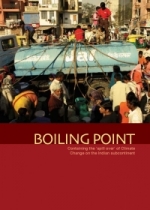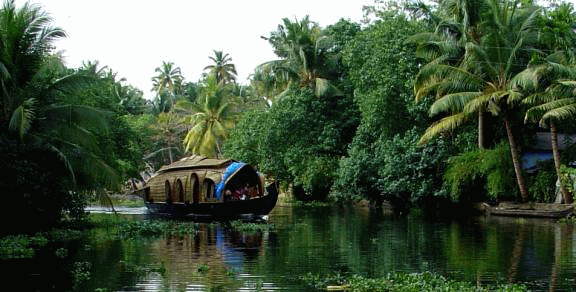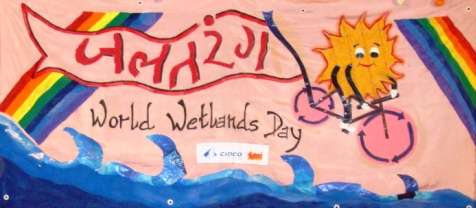Ecology and Environment
Green Solutions J&K, IYCN, Srinagar
Posted on 06 May, 2010 03:18 PM
Organizers: IYCN (Indian Youth Climate Network), Federation Chamber of Industries Kashmir, J&K Bank, Department of Environment and Remote Sensing, and Jammu and Kashmir State Pollution Control Board
Topic: The conference will invite experts and speakers to talk about existing environmental problems in the Jammu and Kashmir region and possible eco-solutions that meet local needs will be provided by the Green Solution Fair.
Venue: Sher-e-Kashmir International Conference Center in Srinagar
Water conservation by Industry – A case study of Indo Rama Synthetics Ltd, Nagpur
Posted on 29 Apr, 2010 10:41 AMThis presentation describes the effort of Indo Rama, Butibori in carrying out production of polyester yarns, fiber and chips in an environmentally conscious manner and its work in conserving and harvesting water in its industrial processes and premises. In particular, it discusses the clean technologies used in production such as –
- Reduction in steam consumption at PSF Plant and in CP (through use of Zimmer technology-based glycol ejector)
- Reduction of drift losses in cooling towers by replacement of eliminators
- Conversion of condensate to flash steam and its reuse in boilers
Eye of the storm: Integrated solutions to the climate, agriculture and water crisis - A brief by IATP
Posted on 28 Apr, 2010 08:20 PMThis brief by Institute for Agriculture and Trade Policy (IATP) acknowledges that climate, water and agriculture are the three important factors that are facing severe crisis in recent years and argues that it is necessary to recognise that these three factors cannot be viewed in isolation, but as converging, interdependent and interconnected factors.
The convergence of these three factors means that solutions to the crisis cannot be found in isolation, but need to be complementary, that move away from dominant industrial agricultural models, to models that are sustainable and just.
More rain water needed for the east flowing rivers of South India
Posted on 25 Apr, 2010 01:58 PMSIMPLE & EFFECTIVE Method to increase WATER to east flowing RIVERS of SOUTH INDIA.
WESTERN GHATS are the mighty walls created by the nature.
Desertification and land degradation status mapping of India - A paper by ISRO
Posted on 20 Apr, 2010 04:12 PMThis paper by ISRO broadly deals with desertification and the process of land degradation in arid, semi-arid and dry sub-humid areas. It describes the classification system, methodology and results of the desertification & land degradation status mapping carried out for the entire country on 1: 500,000 scale using multi-temporal Resourcesat AWiFS data. The dominant processes of land degradation, viz. water erosion, vegetal degradation, wind erosion, salinization, waterlogging, frost heaving, frost shattering and mass movement have been deciphered and mapped using satellite data.
Boiling Point: Containing the spill over of climate change in the Indian subcontinent - A report by Sustainable Environment and Ecological Development Society (SEEDS)
Posted on 08 Apr, 2010 02:07 PM The report ‘Boiling Point’ by Sustainable Environment and Ecological Development Society (SEEDS) discusses the impact of climatic changes at the global, national and local level on the environment and on the current survival, food, water security issues and livelihoods of communities in India.
The report ‘Boiling Point’ by Sustainable Environment and Ecological Development Society (SEEDS) discusses the impact of climatic changes at the global, national and local level on the environment and on the current survival, food, water security issues and livelihoods of communities in India.
The report highlights the problems faced by a number of communities from the different parts of the country by presenting case studies that describe how climatic changes have influenced local livelihoods and survival needs of communities with the marginalised and the deprived being the most affected. The report presents a few case studies that illustrate how people have coped with these problems by finding out appropriate, locally relevant and sustainable solutions.
The report recognises that identification of positive efforts made by individuals or groups of people through the case studies can be one such step towards triggering a discussion and educating the people on the seriousness of the situation and making them realise of the urgency to act fast. The report identifies the need for advocacy and educational efforts based on the bottom up approach involving the grassroot level that can lead to building up of pressure for the need to bring about changes at the policy level.
World Wetland Day 2010 Celebrations - Updates from ATREE
Posted on 24 Mar, 2010 05:21 AM
 The World Wetland day 2010 was celebrated by CERC-ATREE with a number of programmes. As an Annual event ‘WETLAND FESTIVAL 2010’ involving the students and teachers from the wetland clubs of Jalapadom schools around the Lake, was held at Kalyani auditorium, Aleppey.
The World Wetland day 2010 was celebrated by CERC-ATREE with a number of programmes. As an Annual event ‘WETLAND FESTIVAL 2010’ involving the students and teachers from the wetland clubs of Jalapadom schools around the Lake, was held at Kalyani auditorium, Aleppey.
ATREE looking for an Research Assistant Position for Land and Water Research
Posted on 15 Mar, 2010 06:03 PMAshoka Trust for Research in Ecology and the Environment (ATREE), Bangalore is looking to recruit a Research Assistant as part of the Land, Water and Livelihoods Programme (LWLP).
Action plan workshop for the rejuvenation and sustenance of the Arkavathi river basin - Discussion summary and research papers (2009)
Posted on 12 Mar, 2010 04:14 AMA one-day “Action plan workshop for the rejuvenation and sustenance of Arkavathi river basin”, was organised on 25th July 2009, by the Global Academy of Technology and Geological Society of India at Bangalore, to discuss the future of the dying Arkavathi river and Bangalore's precarious water situation, and to develop concurrent implementable action plans to address the problem. The Arkavathi is a tributary of the river Kaveri, originating in Nandi Hills in Chikkaballapur district, that provides about 20% of the total water requirements of Bangalore, with Kaveri providing the remaining 80%.
Jaltarang, a celebration of World Wetlands Day - An update from TERI's wetland management program in Navi Mumbai
Posted on 11 Mar, 2010 10:45 PM The satellite township of Navi Mumbai, with a total area of 344 km2, was developed in 1972 by CIDCO (City and Industrial Development Corporation) to de-congest the city of Mumbai. Initially a marshy land interspersed with villages, Navi Mumbai has been developed into a planned township, with much of its marshes and freshwater wetlands being converted into urban infrastructure.
The satellite township of Navi Mumbai, with a total area of 344 km2, was developed in 1972 by CIDCO (City and Industrial Development Corporation) to de-congest the city of Mumbai. Initially a marshy land interspersed with villages, Navi Mumbai has been developed into a planned township, with much of its marshes and freshwater wetlands being converted into urban infrastructure.
Navi Mumbai is a rapidly developing twin city. In the course of development, it was realized that more emphasis needs to be given towards the preservation and sustainable management of the freshwater wetlands it harbours. Given the vulnerability of these wetlands and their resource potential, there is an urgent need to develop a framework for sustainable use of freshwater wetlands. This requires efficient management systems and development of sustainable models, which would help maintain the natural characteristics of wetlands while also exploiting its potential to meet the socio-economic and recreational needs of communities. To tackle this important aspect, TERI conceptualized a pilot project with active support of CIDCO in October 2008. The Khandeshwar Lake was chosen as a model to demonstrate the feasibility as a ‘sustainable wetland’.
The attached presentation is an update on the work taken up and impact achieved since the start of the project, and includes details from the World Wetlands Day celebration organised on 2 February 2010. Details of TERI's wetland management program are here.




